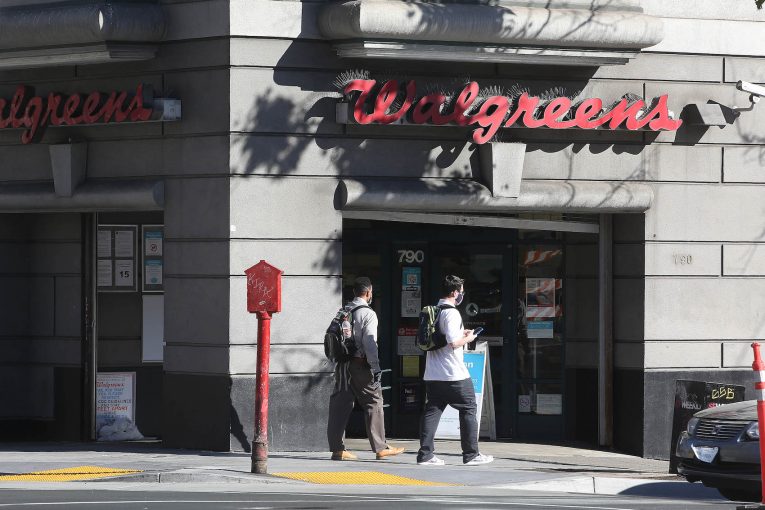

Photo by Lea Suzuki/The San Francisco Chronicle via Getty Images.
By Cynthia Hoang-Duong
SAN FRANCISCO, CA – John Burris, a civil rights attorney representing the family of Banko Brown, announced at a press conference Friday here the filing of a wrongful death lawsuit against Walgreens, its private security company Kingdom Protective Services and security officer Michael Earl-Wayne Anthony.
This follows the fatal encounter between Brown and Anthony at a Walgreens in San Francisco April 27 after Brown was suspected of shoplifting. Screenshots from video surveillance presented by the attorneys show the aggressive quarrel between the two men before Brown was shot and killed by Anthony.
Brown was a 24-year-old transgender man, killed because Walgreens enacted security policies that allowed its security guard to believe that he could shoot an individual suspected of petty theft, said the plaintiffs, who demand at least $25 million in damages.
Burris emphasized the absurdity of the death, stating that the use of lethal force by Anthony and Brown’s consequential death was “woefully unnecessary because the choice that was made … wasn’t a heat of the moment when things were in the middle of a fight and one person pulled out a weapon and shoots the person.”
Rather, Attorney Burris recounted how Brown was outside the Walgreens door entrance, stressing the security guard’s life was not in jeopardy and thus, the aggressive assault on Brown does not constitute self-defense, as claimed by the officer.
Burris lamented, “That’s why this issue with Banko is so painful to accept … The officer could have walked away. He could have backed up. He could have let him go. Or he could have de-escalated and had a conversation. No, he wanted to be physical with his fists, with his arms, and later with his gun.”
Although Anthony claimed Brown made threatening statements, attorney Burris explained the deceased was unarmed and did not reach for a weapon, according to surveillance videos.
The attorney elaborated that earlier statements do not factor into the case because only statements said or actions done at the time of the shooting demonstrate whether the security officer’s life was jeopardized.
Further, statements from security officer Anthony revealed, said Burris, he was “[t]ired of these people (referring to shoplifters)” and “It’s a lot to deal with. It’s a lot of pressure. A person can only take so much. When you are limited to certain options, something will happen.”
Brown’s family has filed a lawsuit against Walgreens and Anthony’s employer for its security policies which instruct employees to confront individuals and allow them to carry guns, explained Burris, adding the directives from the companies played a role in the aggressive assaults against Brown.
The lawsuit claims that because Walgreens sent an individual not emotionally fit to guard the door, they created circumstances that prompted the officer to use deadly force when he could have de-escalated the situation and walked away.
“Walgreens is responsible. It’s Mr. Banko’s blood that is … their conscience, and their hands because they put in motion, by hiring these security guards and giving them instructions to stop people, to confront people,” Burris said.
The Brown family attorney, Ben Nisenbaum, also spoke at the press conference, and stressed the police are prohibited from using carotid restraint because of its fatalness. Yet, during the scuffle, Anthony had applied extensive carotid restraint to Brown, despite the size disparity between the two men.
Nisenbaum acknowledged the pressure placed on security officers from Walgreens and Kingdom Protective Services to detain individuals, causing them to willingly use force.
However, he argued “Banko wasn’t responsible for everything that happened before. He wasn’t responsible for weeks or months of other people shoplifting. He was only responsible for potentially shoplifting the $16 of candy that apparently was in the bag.”
He summarized the gravity of the encounter in a brief question, “How does a [man] get killed for potentially committing a misdemeanor?”
Although the Brown family wants the security officer to face murder charges, their attorneys are uncertain whether the offense constitutes manslaughter or murder as it depends on whether witnesses corroborate Anthony’s claims that Brown threatened, “I’m going to stab you.”
During the questions portion of the press conference, a reporter inquired about Walgreens’ gun policy. Burris notes Walgreens has since ended its use of guns for security officers, suggesting that the corporation is aware of the danger.
Calling it “egregious,” Burris criticized the corporation for enacting a policy that had the potential to harm individuals if carelessly employed.
When asked about his opinion on what the security officer should have done besides the use of lethal force, Burris responded with the option to de-escalate and speak with the individual.
He contended, “Deadly force … should rarely ever be used in a petty theft situation. You have to weigh against the value of what you’re trying to protect versus what you’re about to take.”
Considering the loss of an individual’s life versus the $16 bag of candy, he emphasized the incident was not a grand theft robbery with guns. Rather, Brown, dwarfed by Anthony, was immediately assaulted and not given the chance to surrender the items.
Regarding the district attorney’s office’s decision to not file charges against Anthony, Burris acknowledged that stores have the right to protect against theft and the DA has the obligation to prosecute individuals for committing such crimes.
However, Burris added, the DA’s office has the same responsibility when individuals abuse such rights and use greater force than necessary, killing a person for a misdemeanor.
The Brown family’s lawsuit revolves around the fact that Walgreens has the “right to check property,” but they “don’t have a right to kill people unnecessarily,” Burris noted.